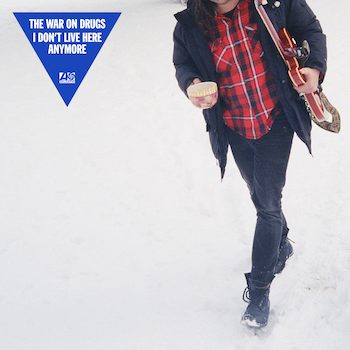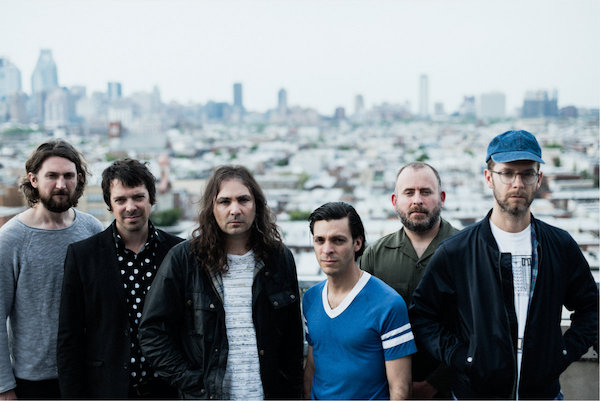Rock Album Review: The War on Drugs — Sticking to the Straightforward
By Alexander Szeptycki
The album is not so much a step forward as a distillation of what The War on Drugs has always done well.
 Like most bands that have been around for over a decade, Philadelphia rock outfit The War on Drugs has settled into a comfortable groove.The group’s tracks are filled with breathless riffing and cavernous synth lines, with meaty, driving drums providing a thumping contrast. This is rock ‘n ‘roll made for speeding through wide open spaces in a car, music tailored for filling cavernous arenas played by a band that is following in the footsteps of American rock prophets like Tom Petty and The Boss. Frontman Adam Granduciel infuses the tunes with breathy, almost spoken vocals that speak to existential anxieties. On their album I Don’t Live Here Anymore, The War on Drugs is at their most straightforward: this is a brighter, more clear-eyed take on the same music they’ve been making for a decade.
Like most bands that have been around for over a decade, Philadelphia rock outfit The War on Drugs has settled into a comfortable groove.The group’s tracks are filled with breathless riffing and cavernous synth lines, with meaty, driving drums providing a thumping contrast. This is rock ‘n ‘roll made for speeding through wide open spaces in a car, music tailored for filling cavernous arenas played by a band that is following in the footsteps of American rock prophets like Tom Petty and The Boss. Frontman Adam Granduciel infuses the tunes with breathy, almost spoken vocals that speak to existential anxieties. On their album I Don’t Live Here Anymore, The War on Drugs is at their most straightforward: this is a brighter, more clear-eyed take on the same music they’ve been making for a decade.
Overall, I Don’t Live Here Anymore provides a much cleaner sonic experience than usual. Distortion played a big part in earlier War on Drugs albums; it was part of the band’s moody atmosphere. The element is mostly phased out here, replaced by bare piano keys and twangy electric guitars. The change is a reflection of the band’s wholehearted commitment to the aesthetic of “heartland rock.” The tune “Change” emphasizes this shift: a jangly guitar plucks the lead before a bright, echoing verse pops up, with sunny acoustic strumming and soft piano lines coming in to add depth. This builds to the chorus, when a massive instrumental arrives to accentuate the vocals, as Granduciel sings, “I don’t wanna change/I’ll rise above it.” Moments like this give us The War on Drugs at their best; the grandiose riffs and breadth of sound earn their emotional keep.
Sometimes, the band hits this elemental approach too hard. “Living Proof,” the opening track, attempts to build a song up from scratch. Elements are added, one by one. First understated acoustic strumming, then a piano cadence is followed by an electric guitar. Finally, faint drums are brought in. It’s all a bit too minimal for me — the band’s signature brand of rock grandeur is missing. And when the song swells to a chorus, there’s no big payoff.
But when The War on Drugs stick to what they do well, they score. “Harmonia’s Dream” is a prime example of how powerful their layered songwriting can be: well-placed piano chords are used to drive breathless rhythm guitars. “I’m a rolling wave that moves across the line/Am I losing my faith we’re gonna lose it in time,” sings Granduciel as the band breaks into the chorus, the mix filling up with loud, dazzling synths. This fury is offset with the inclusion of a quietly deft guitar solo — breakneck plucking, but played delicately. There’s so much range in the music here, but the band is so tight that it all sounds easy.
There are some mixed results here when the speed drops. “Old Skin” opens with baroque ballad-heavenly synth sounds, a weighty piano line, and Granduciel’s lonely voice: “I was born in a pyramid/By an old interstate.” This is all pretty pretentious, to the point that it stops the album in its tracks. Thankfully, the song eventually becomes exciting with a booming, slow burn finale
“I Don’t Wanna Wait” is another deviation from The War on Drugs norm, but it successfully manages a shift of tone as well as pace. It opens eerie and deconstructed, with rasping synth and guitar lines echoing through a stark mix, backed by barely-there synth drums. The tune slowly coalesces into a dark groove, before exploding into full force with a pair of ripping guitar solos. The tension at the opening is memorably broken; it’s captivating songwriting.

The War on Drugs. Photo: Bandcamp
The lyrics are also part of the album’s mixed bag. Granduciel has always had a knack for articulating his deepest anxieties through vivid but cryptic words; he deals with his demons without laying all bare. There’s a lot of that kind of ambiguous allusion here. “Maybe I was born too late/For this lonely freedom fight,” he wonders on “Change,” pointedly fusing the political and the personal. But there are times here when he just comes off as weirdly vague. For example, “I Don’t Wanna Wait” has the line “The shadows are scattered/like rings of gold.” It doesn’t make a lot of sense, and there are times when the songs are gently dragged down by this kind of incomprehension.
Still, I Don’t Live Here Anymore mostly relies on the band’s greatest strength, its ability to generate the kind of forward momentum that draws in listeners. For example, “I Don’t Live Here Anymore,” the title track, charges ahead but also manages to look back as it does. Here Granduciel is remembering an earlier stage of his life, recalling memories: “Like the night we went to see Bob Dylan/And danced to Desolation Row/But I don’t live here anymore/But I don’t got no place to go.” An idealized past clashes with an uncertain future.
So the album is not so much a step forward as a distillation of what The War on Drugs has always done well. The band is paring back some of its bells and whistles and changing up some of the usual atmosphere. The result is a welcome excursion into the tried-and-true.
Alex Szeptycki is a writer from Charlottesville, VA. He recently graduated from Stanford University, majoring in American Studies with a focus in contemporary art and pop culture. He’s currently working as a freelance writer at the Arts Fuse while navigating post-grad life in a pandemic.
Tagged: Alex Szeptycki, I Don’t Live Here Anymore

